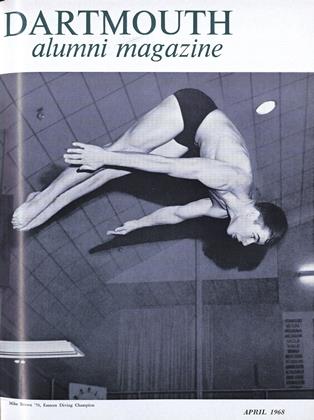By Samuel Edwards.Englewood Cliffs: Prentice-Hall,Inc., 1968. 277 pp. $6.95.
Class of 1790, he was more spectacularly eccentric, more briefly brilliant than any graduate before or since, and most likely you have never heard of him. As a boy of six, William Eaton could recite by heart (so he said) all of Paradise Lost, and as a military man he quoted by the yard Shakespeare and the Bible. In College, a natural linguist, he studied French, Greek, and Latin, earned his Phi Beta Kappa key, and spoke four different North American Indian dialects. So fluent was he in four Arab dialects that each might have been his native tongue, and he was equally at home in the patois, part Italian, part Turkish, and part Egyptian-Arabic, the lingua franca of the North African pirate states.
He astounded Arabs. No Bedouin could equal him as horseman so gracefully did he sit his nostril-snorting stallion. No Algerian or Tunisian marksman could outshoot him with a rifle. With knives concealed in his sleeves, he could hit a target with one 80 feet away. He could twirl a scimitar over his head with a skill displayed only by the Janissary Household Regiment of the Turkish Sultan in Constantinople. With it and tranquility of spirit he could cut off enemies' heads in a single stroke. Squatting in Arab dress on the floor, he ate with his fingers. He asked to be buried upright with his favorite stallion, because, prone, he was subject to nightmares.
Eaton was a reckless gambler. "Fate is a slow journey," he wrote, "through the labyrinth of politics. Such a lot is not for me. I must find glory more quickly ere my candle sputters and dies." Aged 16, he ran away from home, taught school, married a querulous widow, joined the Army to be rid of her, and fought Indians for five years.
In 1799, fat and 35, he turned up in Africa after he had persuaded the sceptical President Jefferson that the best antidote for Barbary pirates who had collected $1,150,000 was to place an American puppet on the throne of Tripoli. When Murad Reis, Commander-in-Chief of the Tripolitanian Navy, attempted to blackmail James L. Cathcart, Consular Agent, by demanding within four months $50,000 in cash and another $50,000 in naval stores if the American flagpole were not to be chopped down, Eaton kicked Reis downstairs.
Eaton's desert march has led his biographer to describe him as "the flamboyant hero who was truly America's 'Lawrence of Arabia.'" As head of a motley army of 500, U. S. Marines, Arabs, Greeks, and international adventurers, "General" (he was actually only a captain) Eaton marched from Burj el Arab, 40 miles west of Alexandria, across the Libyan desert to Derna, 520 miles away, but nearer 700 because he had no maps or reliable guides. Without governmental authority he rented hundreds of camels and purchased on credit supplies costing about $100,000. An English adventurer stole his cash reserves. Marines had to sleep on their rifles to prevent thievery. From the outset, a perfect target for snipers, Eaton rode out in front, alone, with no protection. He subsisted on boiled goat stew which made non-Arabs retch.
Defeating the Dey at Derna, Eaton established himself as ruler and adopted the role and attitudes of an independent Arab chieftain. Returning to the United States for a hero's welcome, the General, who had in him more Walter Mitty than Caspar Milquetoast, discovered, even though Massachusetts deeded him 10,000 acres of land, that the sun had set with tropical brevity on him as military genius. The bottle solaced him so that he drank himself to death at the age of 53. The EncyclopediaAmericana of 1963 gives to Eaton only 18 lines but 87 and a picture to Lawrence of Arabia. Written in popular style, Samuel Edwards' biography has been long overdue.
JOHN HURD '21
-
 Article
ArticleHanover's First Aid Maestro
December 1942 By JOHN HURD '21 -
 Books
BooksJOHN MILTON. PARADISE LOST, PARADISE REGAINED, AND SAMSON AGONISTES.
MAY 1969 By JOHN HURD '21 -
 Books
BooksTHE IGNORANCE OF CERTAINTY.
MARCH 1971 By JOHN HURD '21 -
 Article
ArticleGREEN HIGHLANDERS AND PINK LADIES.
MARCH 1972 By JOHN HURD '21 -
 Books
BooksALL THE BEST IN THE CARIBBEAN INCLUDING PUERTO RICO AND THE VIRGIN ISLANDS.
JULY 1972 By JOHN HURD '21 -
 Books
BooksFIELDS OF GRACE.
APRIL 1973 By JOHN HURD '21
Books
-
 Books
BooksThe October issue of POETRY contains a group of poems
November 1938 -
 Books
BooksAlumni Articles
April 1946 -
 Books
BooksTHE DEFENSE OF BERLIN.
JULY 1964 By HENRY W. EHRMANN -
 Books
BooksTHE MYTH OF ROME'S FALL.
JUNE 1959 By NORMAN A. DOENGES -
 Books
BooksINTERNAL STRUCTURE OF GRANITIC PEGMATITES.
December 1949 By Richard E. Stoiber '32 -
 Books
BooksA DIARY FROM DIXIE
January 1950 By William Randall Waterman







